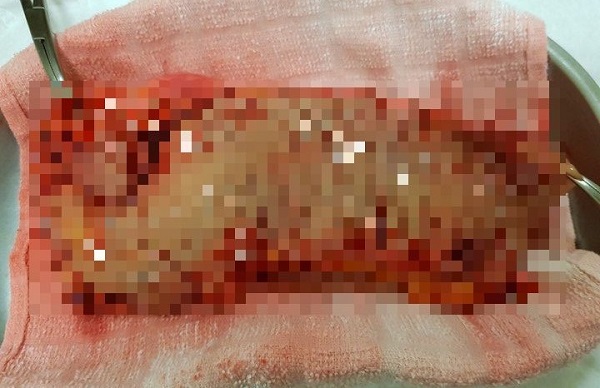Due to the periodic examination, the detection of 3 polyps at an early stage has not developed into cancer, so a woman can fully recover despite losing the 20 cm colon segment. - LaborPress
Morning 7 November, City International Hospital had successfully saved and removed the 20 cm colon polyps for a woman who had been carrying it for 6 years. Patient L.T.L (55 years old, living in Binh Duong) came to the clinic with symptoms of weight loss, bloody bowel movements, and heartburn.

CIH's Team of GI surgeons
At City International Hospital, the patient was diagnosed with large dysplastic high adenomatous polyps with 2 small sigma colon polyps and 1 large rectal polyps. To avoid the risk of polyps developing into cancer, City International Hospital's General Surgery Department indicated that the surgeon would be removed and after 4 hours, a 20cm colorectal segment containing 3 polyps of 1 to 3 cm size would be removed after 4 hours. .
Six years ago, Ms. L. also had gastric polyps and in the last year, she had heartburn, but she often had normal activities and eating but thought that her stomach would recur. In the last two months, she lost 3 kg of weight, had bloody bowel movements, and went to check when she found a tumor in her rectum

The surgeon makes a cut of 8 inches (20.3 centimeters)
According to Assoc. Prof. Dr. Nguyen Tan Cuong (main surgeon), colorectal cancer is no longer a death sentence and is one of the most preventable forms of cancer—if you are screened for hidden warning signs while you are still healthy. Screening finds precancerous growths on the colon wall, called polyps, which the doctor can then remove.
"They are not cancer, and most of them have not started to change into cancer. Follow-up exams at the right time are essential to prevent cancer from developing. Fortunately, the patient was in the early stage has not developed into cancer, so after surgery and treatment, the patient can recover completely. After surgery, after a few years, the lymph nodes have metastasized at this time, the treatment would be challenging and difficult." Dr. Nguyen Tan Cuong emphasized.
" Get the best exam you can. Whenever you have a colonoscopy, you should have the highest quality exam possible so the doctor can find all the polyps. During the colon-cleansing "prep" before the colonoscopy, follow the instructions to the letter. Eating a low-fiber diet for four to five days may improve the quality of the prep, That's because fiber gets stuck in the nooks and crannies of the colon wall, and can block the doctor's view. For colonoscopy to prevent cancer, the doctor must find and remove as many precancerous growths as possible." Dr. Nguyen Tan Cuong says.
Reducing your risk
After polyp removal, certain steps may lower your risk of colon cancer:
- Eat less meat: Eat a healthy diet, with minimal red meat—especially processed or cured meats. Studies suggest that people with meat-rich diets tend to have higher rates of colon cancer.
- Aspirin: Some research suggests that taking aspirin may reduce overall colon cancer risk, but the evidence is not definite. If you need to take aspirin for your heart, then it may offer some protection for the colon.
- Calcium: Research has also linked a calcium-rich diet to lower colon cancer risk, but this, too, is uncertain. If you are already eat a healthy calcium rich diet to preserve bone health, you might get an extra "bump" of cancer prevention.
Disclaimer:
As a service to our readers, City International Hospital provides access to our library of archived content. Please note the date of last review on all articles. No content on this site, regardless of date, should ever be used as a substitute for direct medical advice from your doctor or other qualified clinician.










